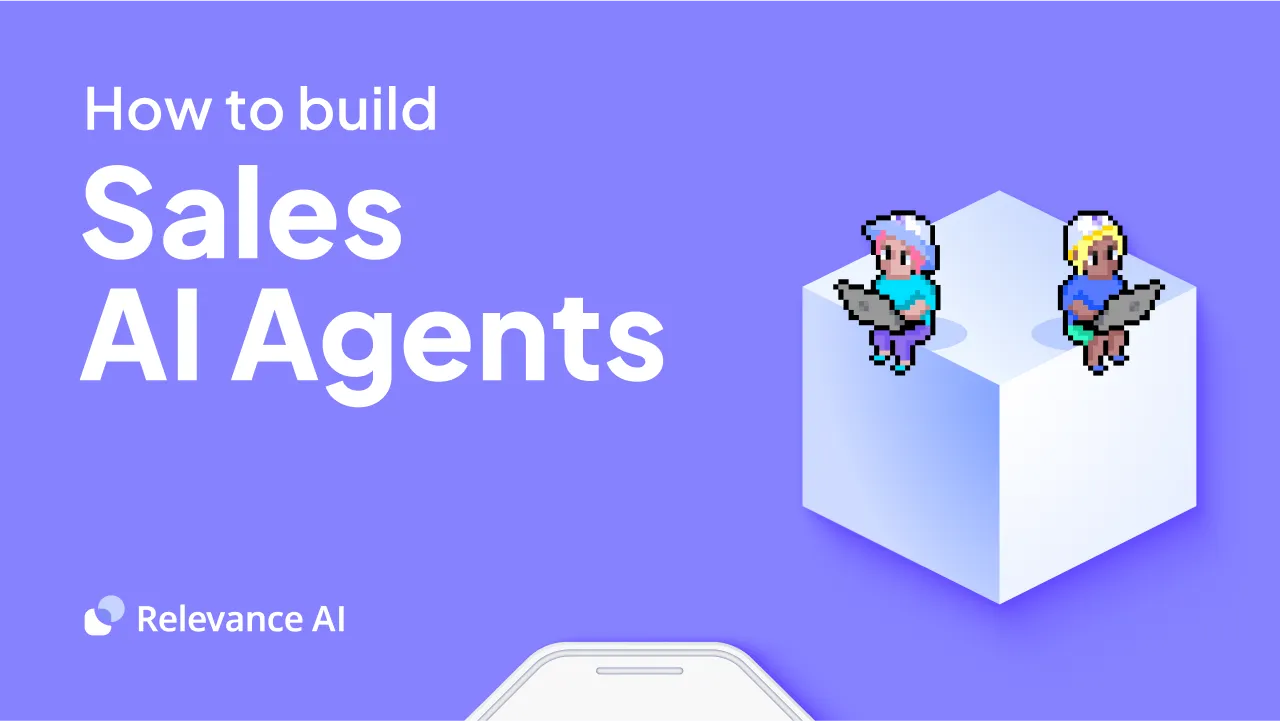
Introduction
AI agents are intelligent computer programs that can process human language, make decisions, and execute tasks autonomously. They integrate natural language processing, machine learning, and automation tools to serve as digital assistants, enhancing business functions such as sales, customer service, and data analysis.
This guide will walk you through the process of developing AI agents specifically for sales applications. We'll explore fundamental concepts, essential technologies, and step-by-step instructions for building, integrating, optimizing, and measuring the success of AI-powered sales agents. By the end, you'll have practical insights into selecting the right tools, training your AI, and creating seamless sales workflows.
Ready to supercharge your sales team with AI? Let’s dive in! 🤖💼💰
Understanding AI Agents
AI agents act as digital sales assistants capable of complex interactions and autonomous decision-making. They leverage advanced algorithms, machine learning models, and natural language processing to understand the digital environment, analyze data, and optimize their responses.
Key Characteristics of AI Agents:
- Autonomous decision-making: AI agents can make real-time choices based on predefined logic and learned behaviors.
- Adaptive learning: They continuously improve by analyzing past interactions and feedback.
- Real-time data processing: AI agents process vast amounts of customer and market data instantly.
- Natural language understanding: Through LLMs (Large Language Models), they communicate fluently and handle complex queries.
- Tool utilization: They integrate with CRMs, databases, and marketing automation platforms.
- Self-improvement: Feedback loops refine their accuracy and efficiency over time.
A multi-agent approach is especially powerful, where specialized AI agents collaborate—one focusing on lead generation, another on customer engagement, and another on sales analytics.
AI Agents in Sales
AI-driven sales agents revolutionize sales operations by streamlining tasks, providing deep insights, and enhancing customer interactions. These agents leverage data analytics and automation to improve efficiency and decision-making.
Core Functions of AI Sales Agents:
- Lead Qualification: AI evaluates and prioritizes leads based on predefined criteria.
- Personalized Outreach: AI tailors messaging to customer preferences and behaviors.
- Sales Forecasting: AI predicts future revenue trends using historical and real-time data.
- Customer Segmentation: AI categorizes prospects based on shared characteristics for targeted marketing.
- Performance Analysis: AI tracks sales metrics and optimizes strategies.
Example: AI-driven dynamic pricing adjusts product prices in real-time based on competitor pricing, demand trends, and inventory levels, maximizing revenue potential.
Building and Training AI Agents
To build an effective AI sales agent, you need a structured approach to machine learning and natural language processing (NLP). The core components include:
Machine Learning for Sales Agents:
- Data Collection: Gather sales data from emails, call logs, CRM systems, and historical transactions.
- Pattern Recognition: Train AI models to detect behavioral trends in customer interactions.
- Continuous Learning: Improve AI performance through iterative training and feedback.
NLP Capabilities:
- Intent Recognition: Understand user inquiries and requests.
- Entity Extraction: Identify key details such as names, dates, and product preferences.
- Sentiment Analysis: Detect emotions and gauge customer interest levels.
- Response Generation: Provide contextual, human-like answers.
Pro Tip: High-quality labeled data significantly improves AI accuracy. Ensure your training datasets are well-structured and diverse.
Steps to Build an AI Sales Agent
1. Define Requirements
- Identify sales tasks the AI will automate (e.g., lead scoring, follow-ups, data analysis).
- Define key performance indicators (KPIs) to measure success.
- Determine integration needs with existing sales software (CRM, email tools, chatbots).
2. Prepare Training Data
- Aggregate and clean customer interaction data.
- Create structured datasets for training and validation.
- Implement data update protocols for continuous learning.
3. Choose the Right Technology Stack
- AI Frameworks: TensorFlow, PyTorch
- NLP Models: OpenAI's GPT, BERT, T5
- Cloud Infrastructure: AWS, Google Cloud, Azure
- Integration Tools: Zapier, APIs, webhooks
4. Develop and Train the AI Agent
- Train the model using sales conversation datasets.
- Validate AI responses with A/B testing.
- Implement reinforcement learning techniques to improve decision-making.
5. Test and Optimize
- Conduct unit, integration, and user acceptance testing.
- Monitor real-world performance metrics.
- Continuously retrain AI with new data and feedback.
Integrating AI Agents into Sales Workflows
Seamless integration is critical for maximizing the AI agent's impact. Follow these best practices:
Mapping Sales Processes:
- Identify where AI can provide the most value (e.g., lead nurturing, outreach automation).
- Ensure smooth data flow between AI agents and CRMs.
Designing an Intuitive UI for Sales Teams:
- Provide real-time AI insights within existing sales dashboards.
- Allow human agents to override AI decisions when necessary.
- Collect feedback to fine-tune AI performance.
Training Sales Teams:
- Educate teams on AI capabilities and best practices.
- Set guidelines for human-AI collaboration.
- Establish support channels for troubleshooting AI-related issues.
Optimizing AI Sales Agent Performance
AI performance optimization involves continuous monitoring and refinement. Key focus areas include:
- Conversion Rate Tracking: Measure AI-driven deal closures.
- Response Accuracy: Assess how well AI understands and answers queries.
- User Feedback Integration: Improve AI based on salesperson and customer input.
- A/B Testing: Experiment with different AI strategies and refine based on results.
Case Study: A SaaS company enhanced its AI sales agent by analyzing call transcripts, leading to a 40% improvement in AI-driven customer responses.
Benefits of AI Agents in Sales
AI-powered sales agents drive efficiency, revenue, and personalized customer experiences:
- Better Lead Scoring: AI considers behavioral data, social media activity, and CRM interactions to prioritize high-potential leads.
- Scalable Personalization: AI customizes outreach based on browsing behavior, previous purchases, and seasonal trends.
- Cost Reduction: Automating repetitive sales tasks lowers operational expenses.
Challenges and Future of AI in Sales
Challenges:
- Data Integration Issues: AI requires seamless access to customer and sales data.
- Privacy & Security Concerns: Companies must comply with GDPR, CCPA, and other regulations.
- Human-AI Collaboration: Ensuring AI assists rather than replaces human sales teams.
Future Trends:
- Emotion Recognition AI: AI agents will analyze tone and sentiment in real time.
- Hyper-Personalization: AI will refine recommendations based on micro-behaviors.
- Augmented Reality AI Sales Assistants: AI-driven virtual product demonstrations.
Conclusion
AI sales agents represent a powerful evolution in sales strategy, leveraging NLP, machine learning, and automation to streamline workflows and enhance customer interactions.
Quick Start Tip: Begin by implementing an AI-driven lead qualification system to automate scoring and prioritization, allowing your sales team to focus on high-value prospects.
Now, let your AI sales agent do the heavy lifting while you focus on closing the biggest deals! 🚀💰

















